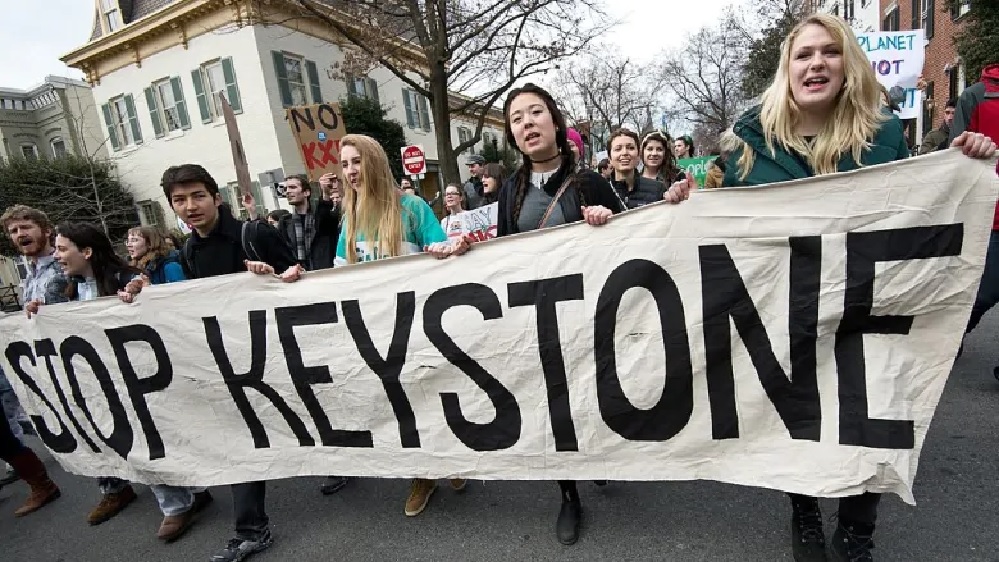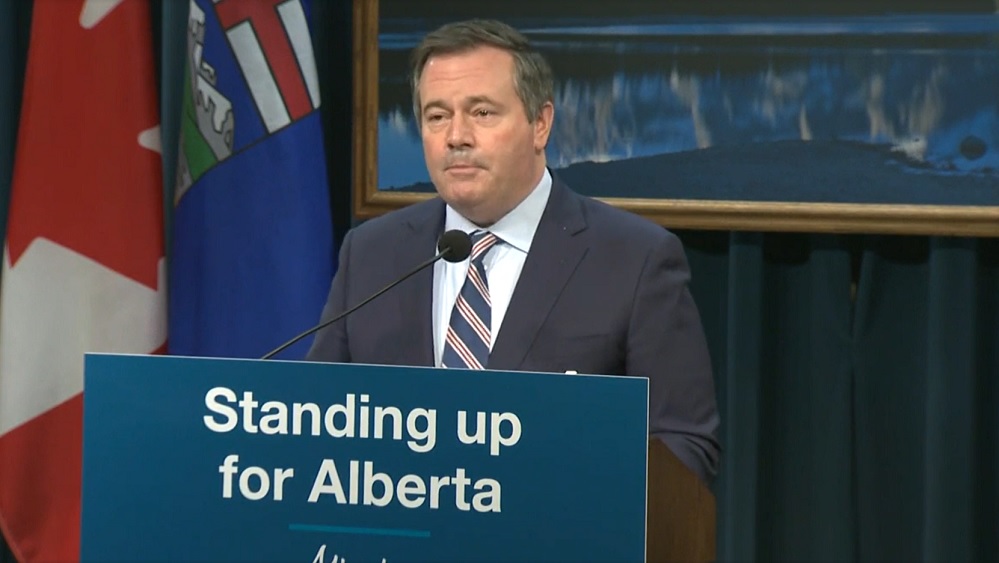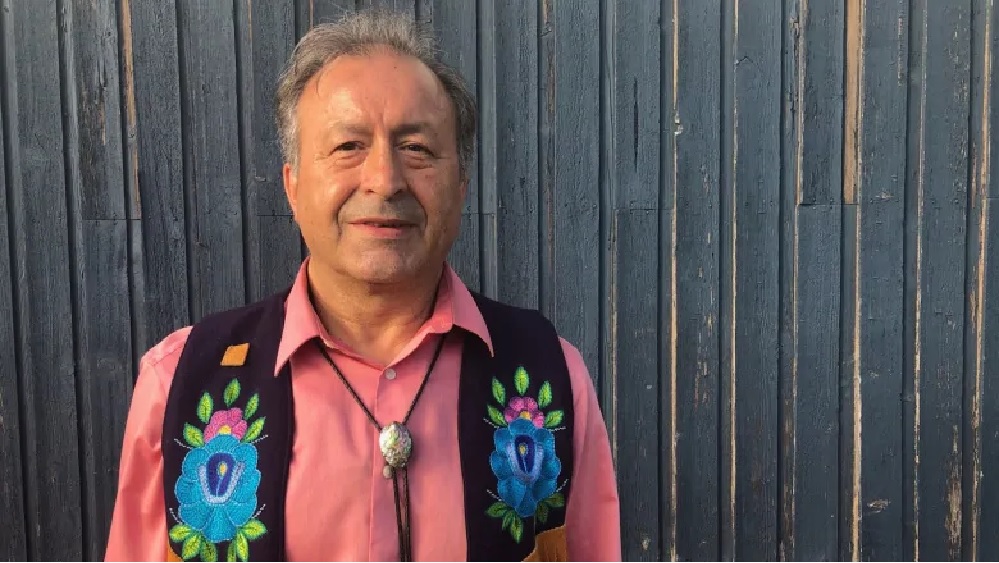U.S. President Joe Biden had indicated during his election campaign that he was against the huge Keystone expansion pipeline project, and indeed on his first day as President he signed an order revoking the project’s permit.
The pipeline, like almost all such projects in recent years, has been the subject of a multitude of protests over its environmental implications.

One of many such anti-Keystone protests over several years. Students protesting against the proposed Keystone XL pipeline march to the residence of U.S. Secretary of State John Kerry in Washington, D.C. on March 2, 2014. U.S. environmentalists are taking credit for organizing a broad enough resistance against the pipeline to delay it and slow down production growth in the Alberta’s oilsands. (Nicholas Kamm/AFP/Getty Images)
The project would have enabled an additional 830,000 barrels of Alberta crude to be transported south to U.S. refineries. Proponents have said the protests are misguided. The economic benefits aside, TC Energy said the pipeline would have net-aero emissions by 2030 and that as there is still a big demand for oil that will now be filled by the refineries by other more polluting methods, such as trains, trucks, and tanker ships, and from other sources far less concerned about environmental rules than Alberta or the U.S.
Prior to the announcement yesterday, TC Energy had already stopped all work on the project anticipating the presidential veto. Following the cancellation, the company said in a statement, ““The action (will) directly lead to the layoff of thousands of union workers and negatively impact ground-breaking industry commitments to use new renewable energy as well as historic equity partnerships with Indigenous communities,”
Alberta Premier Jason Kenney, who had invested over $1 billion of the province’s money in the project, labeled the cancellation a “gut punch” to the Albertan and Canadian economy and an “insult”. He also made a very strong call for the Prime Minister to defend the pipeline during a news conference in reaction to the cancellation saying, ““If, however, the U.S. government refuses to open the door to a constructive and respectful dialogue about these issues, then it is clear that the Government of Canada must impose meaningful trade and economic sanctions in response to defend our country’s vital economic interests,”

At a news conference following the Biden cancellation, Alberta Premier Jason Kenney spoke out strongly against the decision and said the Prime Minister Trudeau should defend the thousands of jobs involved and the $90 billion export of Canadian energy to the U.S (via CBC)
That seems unlikely as Prime Minister Justin Trudeau said, “While we welcome the President’s commitment to fight climate change, we are disappointed but acknowledge the President’s decision to fulfill his election campaign promise on Keystone XL”
In anticipation of the cancellation, federal environment minister Jonathan Wilkinson on Tuesday also indicated federal reluctance to engage in retribution saying, “Canadian energy opportunities with the United States are bigger than any one project.”
The end of mega pipeline projects?
Investors say the move by Biden also sends a message to industry that building any major new pipeline will not happen. Several projects in the U.S were already stopped due to various lengthy approval efforts, litigation launched by opponents and delays which make the projects simply too expensive and time consuming.

Bill Erasmus was the Dene national chief for almost 30 years and is happy to hear the Keystone XL pipeline project will stop. ‘Our people have been concerned about pipelines being built south of us for a long time.’ However, many other Indigenous leaders wanted the line to be built for the economic opportunities they would have had (John Last/CBC)
The huge multi-billion dollar Teck oilsands project in northern Alberta was abandoned over continued litigation challenges, while a gas pipeline in northern B.C. was blocked by Indigenous protests which escalated into blockades of national railways nearly bringing the economy to a standstill.
Meanwhile, Indigenous groups in Canada are divided on the issue. Chief Alvin Francis is president of Natural Law Energy, a coalition of Indigenous groups that supported the pipeline saying it would have provided a great many long-term jobs for Indigenous peoples and enable new infrastructure for many reserves.
Ron Quintal is president of the Fort McKay Metis Nation. Quoted in the Calgary Herald he said, “We weigh each and every project carefully and wholeheartedly. We put a lot of work into each project and honestly, there is no finer pipeline project that I know of in the whole world. This one is tops when it comes to protecting the environment. It’s gotten to the point that unless you are far left or far right, your voice isn’t heard — only those polarized voices are heard, but we’re here. We want this pipeline and I would like president(-elect) Biden to know that, to understand that killing this project will be devastating to Indigenous people”.
However, on the other side of the pipeline issue is Bill Erasus, former Dene National Chief for 30 years. For all that time he lobbied against pipelines and oil sands development.
Quoted in the CBC he said, “Our people have been concerned about pipelines being built south of us for a long time. It’s scientifically known that our waters are being contaminated from the tailings ponds. I really think those short-term jobs are not worth polluting the Arctic and affecting our people in a negative way.”
As to what happens now, Premier Kenney has suggested that he may initiate legal action, but also said the massive quantities of pipe and other materiel might be sold to recoup some of the investment. With decreasing chances for pipeline projects anywhere, potentially that might mean the enormous quantities of pipe could be sold simply as scrap.
- Additional information-sources
- Bloomberg:Freitas Jr/ Adams-Heard/ Gilmer: Jan 20/21: Biden blocking Keystone threatens to end era of mega pipelines
- CBC: Jan 19/21: Northern activists react to Biden’s plan to cancel Keystone XL pipeline permit
- Calgary Herald: L Corbella: Indigenous leaders ‘devastated’ by Biden’s predicted scrapping of KXL pipeline
- Alberta Native News (TorontoStar): J Cardinal: Keystone pipeline cancellation impacts its First Nations investors in Alberta
- Global News: Jan 20/21: Alberta Premier Jason Kenney blasts President Biden on revoked Keystone XL permit ( video)
- Edmonton Journal: Joannu/Johnson: Jan21/21: Kenney calls on federal government to impose trade sanctions if Biden does not review keystone XL decision
- Bloomberg: R Tuttle: jan 20/21: Kenney calls Biden’s keystone XL decision an ‘insult’
- Huffpost: A Raj: Jan 20/21: Environment minister says Canada-U.S. opportunities are ‘bigger’ than Keystone XL
- Bloomberg (FP): Tuttle/Bolongaro: Jan 18/21: Keystone XL may be sold for scrap if Biden moves to kill it







For reasons beyond our control, and for an undetermined period of time, our comment section is now closed. However, our social networks remain open to your contributions.